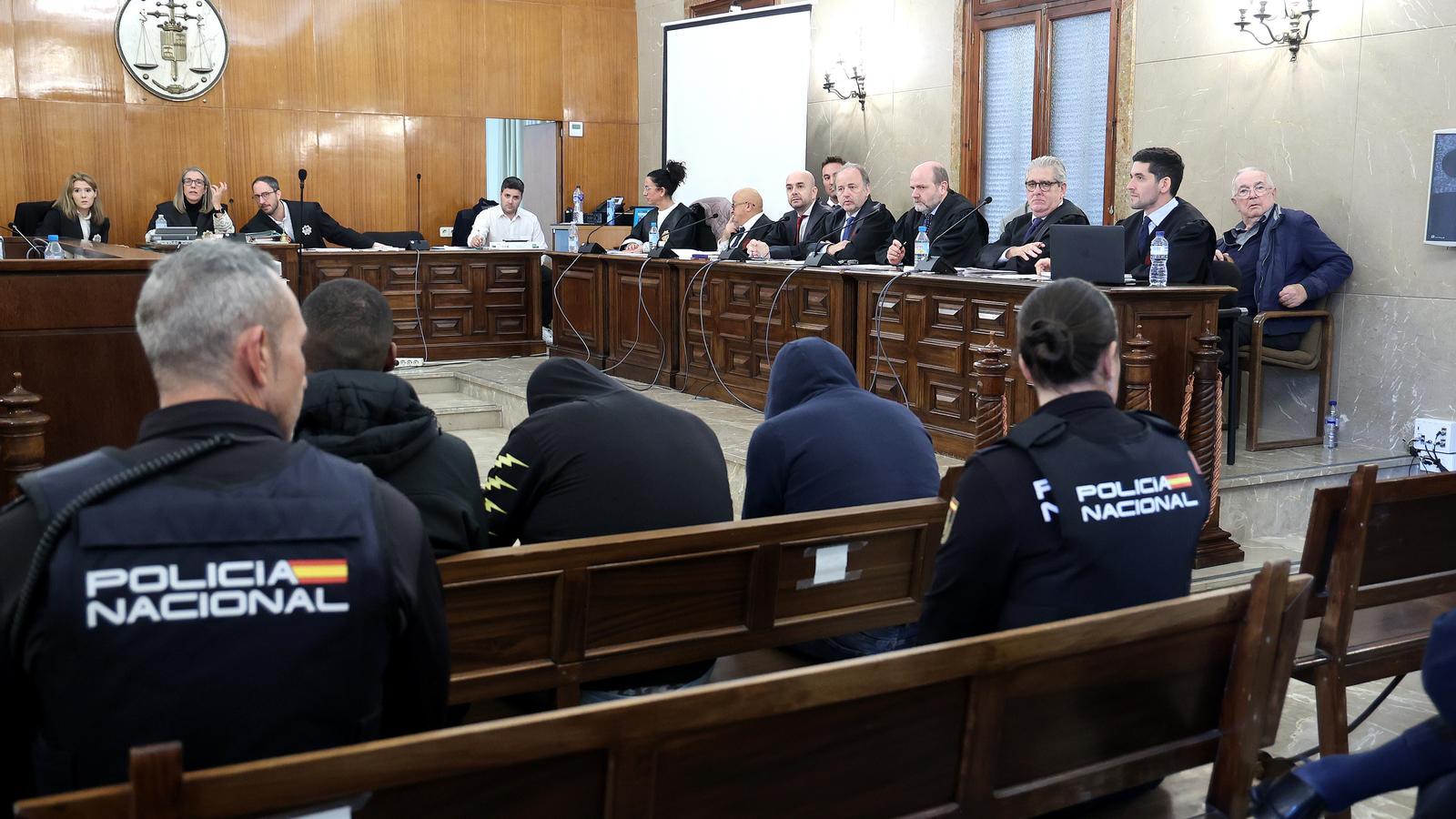The stress of being a jury member: "For me, the accused was guilty and we acquitted him."
1,500 people in the Balearic Islands are participating in a lottery that requires them to pass judgment in a trial. While for some the experience is "enriching", for others it is "unpleasant".


PalmOn the day the conclave to elect the new pope began, the WhatsApp chat Xisca maintains with her fellow members of the jury was reactivated. The eleven members (nine titular and two alternates) were reflected in the closed-door voting process of the cardinals. They also had to deliberate incommunicado for two days until they convicted the two accused of throwing a drunken young German tourist from a van, who died after being run over. "I'd rather be at a polling station than be part of a jury again. I didn't like it. It was a very unpleasant experience having to listen to testimony from both sides, often of a technical nature, dealing with issues you don't understand. You have to pay close attention. The judge always told us you wouldn't pass. She doubted whether she had enough judgment to assess certain data and make a decision. Besides, if you don't make a decision, a non-response counts in favor of the accused, so not taking a position is impossible," says this civil servant, whom the court summoned to be a juror just two months before her term expired.
67 euros plus expenses
A computer system randomly selects candidates for popular juries every two years. In the Balearic Islands, 1,500 people are appointed, selected from a census of nearly 800,000 people over the age of 18. The requirements are to be Spanish, literate, have full political rights, be a resident of the municipality or province where the crime was committed, and not be physically, mentally, or sensorially impaired. Those with pending legal cases are excluded. Appeals can be submitted, which the Administration will review based on established assumptions, but the initial summons is mandatory and requires payment of 67 euros plus daily allowances.
Those selected receive a first certified letter informing them they're included in the pool of 1,500, and are notified again if, in the second drawing, they're assigned a specific trial. "I don't win the lottery, but I do. When a plainclothes police officer with his badge brought me the letter, I was terrified," recalls Joan [not his real name] about "an inexcusable duty." He's a civil servant and requested leave to decide whether the defendant had murdered and burned down another man's shack in Carnaje. Initially, he was designated as a substitute; he was supposed to attend the entire trial (he took 21 pages of notes), but wouldn't participate in the deliberations. However, one of the regulars was coerced, and he took her place just to debate the verdict. "I was in the library; they called me, and I had to rush to the courtroom. My wife brought me a backpack with clothes, and before taking our cell phones to isolate ourselves, they offered to make a call," he recalls. The nine members spent a full day, were escorted to a hotel in Palma, and continued deliberating the next day. "There was a lot of tension. People were crying. Some thought one thing, others another. I reviewed some documents I needed and the defendant's initial statement to the police. I confirmed my opinion. I believed there wasn't enough evidence to convict him, and we applied." in dubio pro reo"He continues, discussing the legal principle that a verdict must be found in favor of the accused if there is any doubt. The verdict was an acquittal. Five votes in favor and four against. The minimum required. A larger majority is required for a guilty verdict: seven out of nine.
When we reach an agreement, the jury must argue the jury's case, with the help of a judicial assistant [an official who supports judicial bodies] who guided us through the writing without directing or giving our opinion at any time," he explains. "The responsibility is very great because you see the pain of two families, and one person's life is in your hands, and so are others, in a way, because you feel you must. Getting to know this world up close has seemed like an enriching experience to me," he confesses. It wasn't for Patricia, who served on a jury when she was 26. Twenty years later, she still believes that the man accused of stabbing her brother to death was guilty, that he did it with the intention of ending his life. "It was a very difficult trial, with the added burden of translation, since it involved a Chinese family. I wouldn't be able to convince anyone and I felt very powerless because, in my opinion, he was guilty and we acquitted him. The process was complicated and I experienced a lot of stress. It's too big a responsibility for ordinary citizens to assume. I didn't enjoy the experience," she says.
People without prejudices
To form the jury, lawyers, prosecutors, and private prosecutors ask a series of questions to assess the suitability of the candidates., since those implicated in his crime were homosexual. The defense and prosecution have the power to challenge, or exclude, four people from the thirty summoned, down to the nine regulars and two alternates. Lawyers must be guided by feelings rather than certainties in this elimination process between the parties. "In Spain, we don't have a culture of preparation in this regard. There are no professionals or psychologists' offices that advise on which jury is best for you. You want people without obvious prejudices. In any case, popular juries are less common here than, for example, in the Anglo-Saxon system," explains criminal lawyer Chiqui Herrero. In the Balearic Islands, on average, one trial per month takes place using this formula. Attorney Jaime Campaner obtained the acquittal by popular jury of Pau Rigo, accused of shooting and killing the thief who broke into his home in Porreres. "It's very instinctive and therefore fallible," he says of the pre-trial citizen selection process. "You can try to select a jury or avoid certain characteristics, but you're not without the risk of the approach being inappropriate. And you're not guaranteed sincerity when answering the parties' questions. There's more instinct than anything else. It's a game of poker. Recusals without needing to say why you're ruling someone out. But the move can backfire if the prosecutor removes someone who would have been a sweet spot."
I work rigorously.
Campanero is "a great defender" of the jury. "In general, they are fair. And, despite people's reluctance, experience shows that they take their job very seriously, with rigor." Herrero agrees that the verdicts are, in many cases, consistent with what a professional judge would have decided, although he understands that "the distress it causes the person chosen is very demanding, and most wouldn't want to be in that position." "I wouldn't be a judge because I couldn't bear the pressure of making decisions about a person," he adds.
Citizen participation in the administration of justice "is a constitutional mandate," reserved for criminal offenses, Campaner clarifies. "It is most widely applied in cases of homicide or murder. It was decided this way because they are very factual issues, depending on whether there is evidence or not. It's not so much about understanding the intricacies of the law as reconstructing the facts. It's about persuading to tip the scales in your favor," he explains.
The approach that lawyers use with popular juries focuses, precisely, "a lot on the facts and their reconstruction," and they strive to be "didactic," without losing sight of the fact that they are being heard by laypeople in the field. "It's a unique experience in this exercise of the task of doing justice. You have to try to get the message you want to convey across, and you can't take for granted issues that you could with a professional jury," he continues. "It involves greater uncertainty, but at the same time it gives you greater freedom and forces you to forget certain deep-rooted structures of traditional procedure," adds Herrero.
In short, according to Campaner, "there are no easy or difficult cases." "It's important to ask the jury to put themselves in the shoes of the accused at the time, and to know what was required of them regarding a decision that must be made in a millisecond," the lawyer concludes, in a reasoning applicable to the high-profile case of Pau Rigo.
